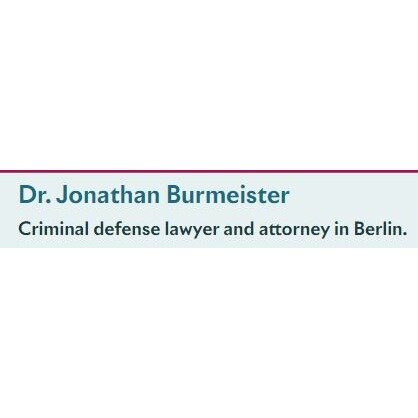Best Arrests & Searches Lawyers in Berlin
Share your needs with us, get contacted by law firms.
Free. Takes 2 min.
List of the best lawyers in Berlin, Germany
About Arrests & Searches Law in Berlin, Germany
Arrests & Searches law in Berlin, Germany governs the legal procedures and regulations surrounding the arrest and search of individuals by law enforcement authorities. These laws are in place to ensure the protection of individual rights and maintain public order and safety. Understanding your rights and responsibilities under Arrests & Searches law is crucial if you find yourself in a situation involving law enforcement.
Why You May Need a Lawyer
There are several situations in which you may require legal help in Arrests & Searches in Berlin, Germany:
- If you have been arrested and believe that your rights have been violated during the arrest process.
- If you need guidance on how to handle a search of your person, vehicle, or property conducted by law enforcement.
- If you are facing criminal charges as a result of an arrest or search.
- If you have been falsely accused and need assistance in proving your innocence.
- If you have questions or concerns regarding your rights and obligations during an arrest or search.
Local Laws Overview
In Berlin, Germany, the following key aspects of local laws are particularly relevant to Arrests & Searches:
- Arrest Procedures: The Berlin Police are authorized to make arrests based on reasonable suspicion or caught-in-the-act offenses. Arrested individuals must be informed of the reasons for their arrest and have the right to legal representation.
- Search Warrants: Law enforcement authorities may conduct searches of premises or individuals if they have a valid search warrant obtained through the proper legal channels. However, there are exceptions where searches may be conducted without a warrant under certain circumstances.
- Rights of the Arrested: Arrested individuals have the right to remain silent and the right to legal counsel. They should not be subjected to any form of torture or ill-treatment during arrest or while in custody.
- Evidence Handling: The handling of evidence obtained during an arrest or search must adhere to strict legal procedures to ensure its admissibility in court.
- Detention Periods: The maximum period of detention without a court order in Berlin is generally 48 hours, after which a court must review and extend the detention if necessary.
Frequently Asked Questions
1. Can the police arrest me without a warrant?
Yes, the Berlin Police can arrest you without a warrant if there is reasonable suspicion or if you are caught committing an offense.
2. What should I do if I am arrested?
If you are arrested, remain calm and comply with the instructions given by the police. You have the right to legal representation, so ask for a lawyer immediately.
3. Can the police search me or my property without a warrant?
In certain situations, the police can conduct searches without a warrant, such as during an immediate threat to public safety or if you give them consent to search.
4. What should I do if I believe my rights were violated during an arrest or search?
If you believe your rights were violated, it is important to seek legal advice from a qualified attorney experienced in Arrests & Searches law to assess your options and protect your rights.
5. How long can the police detain me without a court order?
In most cases, the police can detain you for a maximum of 48 hours without a court order. After this period, a court must review and extend the detention if necessary.
Additional Resources
If you are in need of legal advice or further information regarding Arrests & Searches in Berlin, Germany, the following resources may be helpful:
- Berlin Police Department
- Berlin Legal Aid Society
- The German Criminal Code
Next Steps
If you require legal assistance in Arrests & Searches in Berlin, Germany, it is recommended to take the following steps:
- Contact a reputable lawyer experienced in Arrests & Searches law.
- Arrange a consultation to discuss your specific situation and concerns.
- Provide all relevant information and documentation to your lawyer.
- Follow your lawyer's guidance and advice regarding your rights and legal options.
- Cooperate fully with your lawyer throughout the legal process.
Lawzana helps you find the best lawyers and law firms in Berlin through a curated and pre-screened list of qualified legal professionals. Our platform offers rankings and detailed profiles of attorneys and law firms, allowing you to compare based on practice areas, including Arrests & Searches, experience, and client feedback.
Each profile includes a description of the firm's areas of practice, client reviews, team members and partners, year of establishment, spoken languages, office locations, contact information, social media presence, and any published articles or resources. Most firms on our platform speak English and are experienced in both local and international legal matters.
Get a quote from top-rated law firms in Berlin, Germany — quickly, securely, and without unnecessary hassle.
Disclaimer:
The information provided on this page is for general informational purposes only and does not constitute legal advice. While we strive to ensure the accuracy and relevance of the content, legal information may change over time, and interpretations of the law can vary. You should always consult with a qualified legal professional for advice specific to your situation.
We disclaim all liability for actions taken or not taken based on the content of this page. If you believe any information is incorrect or outdated, please contact us, and we will review and update it where appropriate.












